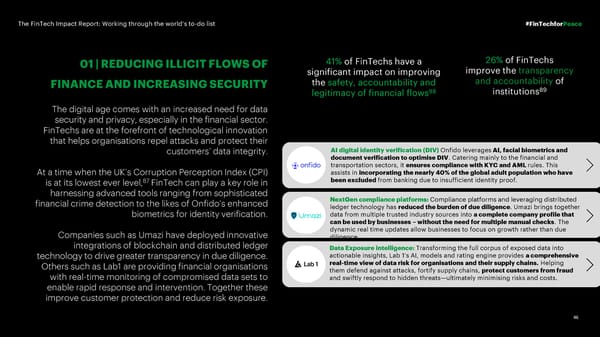The FinTech Impact Report: Working through the world’s to-do list #FinTechforPeace 01 | REDUCING ILLICIT FLOWS OF 41% of FinTechs have a 26% of FinTechs significant impact on improving improve the transparency FINANCE AND INCREASING SECURITY the safety, accountability and and accountability of legitimacy of financial flows88 institutions89 The digital age comes with an increased need for data security and privacy, especially in the financial sector. FinTechs are at the forefront of technological innovation that helps organisations repel attacks and protect their AI digital identity verification (DIV) Onfido leverages AI, facial biometrics and customers’ data integrity. document verification to optimise DIV. Catering mainly to the financial and transportation sectors, it ensures compliance with KYC and AML rules. This assists in incorporating the nearly 40% of the global adult population who have At a time when the UK’s Corruption Perception Index (CPI) been excluded from banking due to insufficient identity proof. 87 is at its lowest ever level, FinTech can play a key role in harnessing advanced tools ranging from sophisticated NextGen compliance platforms: Compliance platforms and leveraging distributed financial crime detection to the likes of Onfido’s enhanced ledger technology has reduced the burden of due diligence. Umazi brings together biometrics for identity verification. data from multiple trusted industry sources into a complete company profile that can be used by businesses – without the need for multiple manual checks. The Companies such as Umazi have deployed innovative dynamic real time updates allow businesses to focus on growth rather than due diligence . integrations of blockchain and distributed ledger Data Exposure intelligence: Transforming the full corpus of exposed data into technology to drive greater transparency in due diligence. actionable insights, Lab 1’s AI, models and rating engine provides a comprehensive Others such as Lab1 are providing financial organisations real-time view of data risk for organisations and their supply chains. Helping with real-time monitoring of compromised data sets to them defend against attacks, fortify supply chains, protect customers from fraud and swiftly respond to hidden threats—ultimately minimising risks and costs. enable rapid response and intervention. Together these improve customer protection and reduce risk exposure. 46
 The FinTech Impact Report: Working through the world’s to-do list Page 45 Page 47
The FinTech Impact Report: Working through the world’s to-do list Page 45 Page 47